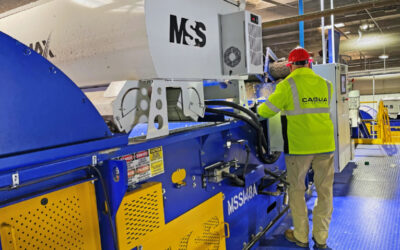Sampson County, North Carolina is perfectly placed for business. Located in the southeast corner of the state and bordered by both I-95 and I-40, the community is a short drive from large metropolitan markets, two deep-water ports, two international airports, military bases, and world-class universities.
~
Raleigh, the state capital, is just an hour to the northwest, while the historic port of Wilmington is an hour to the southeast. “The regional assets really make Sampson County unique,” says John Swope, Executive Director of Sampson County Economic Development Commission. “In economic development, when recruiting industry and business, prospects quite often will say that they want to be within an hour of a major port and within an hour of a major commercial airport. We are the only county in the state that can say we are within and hour or less to the RDU airport and the port of Wilmington.”
While Sampson County enjoys easy access to surrounding amenities, the county itself is rural, giving residents the best of both worlds. “You can come to Sampson County and have lower costs in construction and labor, but you can also have [access to] services that are 30 minutes to an hour away in major cities.” Homes are affordable, land is plentiful, and neighbors are friendly. Of the eight municipalities scattered across the county, the largest, Clinton, has a population of just 9,600 people, while the smallest town has only 250 residents. “Each one of them are very nice communities,” Mr. Swope remarks. “They are well managed; they have a very nice quality of life for families.”
Sampson County’s location makes it an ideal spot for several industries. With multiple military bases scattered throughout the region, the defense industry is strongly represented in the community. Fort Bragg in Fayetteville (home of the Airborne and Special Operations Forces), Seymour Johnson Air Force base in Goldsboro, and Marine Corps Base Camp Lejeune in Jacksonville are all a short drive from Sampson County, which attracts a range of companies looking to do business with the United States military.
Manufacturing has always been a foundational industry in Sampson County and even though some plants have been lost, the community has been remarkably successful in keeping its factories open. In fact, the manufacturing sector still employs around 3,000 locals. The diversity of the manufacturing base has been key to the sector’s ongoing success. “We are fortunate that it has been a mix of different types of industries represented here,” Mr. Swope points out. When one sector weakens, there is always another one to pick up the slack.
Take textiles, for instance. As was once the case throughout rural North Carolina, textiles were foundational to Sampson County’s economy. But in recent years, most of the textile plants have gone overseas. (One big exception is Brooks Brothers, which still produces men’s dress shirts in the county, as well as operating a major distribution center there). With other industries still standing strong – primarily agriculture, forestry, and metalworking – other manufacturers quickly stepped in to make up for the loss of textiles.
For instance, Sampson County’s $800 million agricultural sector has made the community an ideal location for food processing operations. With over 1,000 employees, pork processing giant Smithfield Foods is one of the county’s largest employers. Metal manufacturing has also maintained a strong presence in Sampson County and is responsible for 1,100 local manufacturing jobs. Metalworking operations vary significantly, from the production of finished products to that of metal components to be sold to other metal manufacturers before being formed into a product. One of the most notable metal-related operations is Schindler’s escalator manufacturing complex in Clinton, which includes an escalator step facility and an escalator assembly plant. The escalators produced at this plant can be found throughout the U.S.A., Canada, and Mexico.
Sampson County’s hometown loyalty has also helped keep manufacturers operating locally. “We have several homegrown industries – companies that were started here,” Mr. Swope explains. “They are very loyal; this is their base. If their business goes down, they work hard not to diminish their home plants.”
In addition to holding on to much of its traditional manufacturing, Sampson County is also welcoming new operations. “We’ve got several very good prospects that we have been working with. They are playing off our region’s assets, one from agriculture, one from the timber industry, [as well as] some others.” In total, Sampson County has no fewer than five major manufacturers in the process of moving operations into the county.
A new Enviva manufacturing facility is currently under construction in the community. “They are the leading U.S. manufacturer and exporter of wood pellets, primarily to European Union countries, as a replacement for coal,” Mr. Swope reports. The new operation will produce wood pellets from a mix of low-grade wood resources, using only byproducts from the traditional sawmill industry. Expected to be up and running within a year from now, the new Enviva plant will employ 80 people by the first quarter of 2016 and will bring $107 million in taxable investment. “That is very exciting for us.”
As well, Kansas City Sausage has partnered with Smithfield Foods to open a finished sausage production plant in Sampson County within the next three years. The $44.8 million, 90,000-square-foot manufacturing facility will employ 177 people and process up to 1,000 hogs a day.
Rheinfelden Americas has purchased an existing plant in Clinton and has plans to invest $12 million over the next five years and add 80 fulltime positions to existing operations. The business is a newly formed partnership between two global aluminum container production companies, German-based Rheinfelden Semis and Canadian-based CCL Industries Inc. The new manufacturing facility will produce aluminum slugs to be used in a variety of products, from soft drink cans to cosmetic and pharmaceutical wrappers.
In addition, Chemtex International is “seriously considering” developing a biofuel production facility in Sampson County. The factory would utilize non-food plants to create an environmentally friendly energy source. The proposed operation would employ 65 people and bring a taxable investment of $151 million to the county. Brooks Brothers is also considering a new investment in the community. The upscale clothing company is looking to expand both its existing manufacturing facility and its local manufacturing plant.
“We are very fortunate and excited [to have] these projects,” Mr. Swope remarks. “We have been working with a couple of them for multiple years – the rest of them for the past 12 months – and we are excited that some of them are underway and others are getting close.”
Of course, incoming industry must consider quality of life as well as the local business climate, and fortunately, Sampson County is able to please newcomers on both fronts. “It goes back to our proximity. We are an hour to the closest beaches, a half day’s drive to the mountains, [and an hour from] all that the regional cities offer,” Mr. Swope points out. “It is not unusual for people here to have a home at the beach or White Lake or take a day trip to various regional assets. We are very close to what people want.” The low cost of living, peaceful countryside, and small-town friendliness also attract commuters looking to enjoy access to regional jobs and amenities without the hustle and bustle of urban living.
Sampson County’s positive business environment and high quality of life have combined to make the community one of North Carolina’s most promising up-and-coming locations. “We are on an upswing with these industries coming in,” Mr. Swope points out. And the community is committed to maintaining the county’s rural draw while simultaneously encouraging growth. “They want to stay who they are; they don’t want to lose their small town [feel] or their quality of life that they have. But at the same time, they want business growth. They want job opportunities.”
Fortunately, Sampson County has strong leaders who are capable of steering the community toward success without losing the community’s defining attributes. “We do have leadership that is working toward that,” Mr. Swope insists. “It is not being taken for granted.” The latest efforts to bolster the community include a $110 million investment in local schools to ensure that the county’s educational system stays strong. Local government facilities are also enjoying construction funding, enabling the community to continue supporting its citizens. “Our leadership realizes that they have to be a part of moving the communities and the county forward,” Mr. Swope summarizes. “We are investing in the future.”













